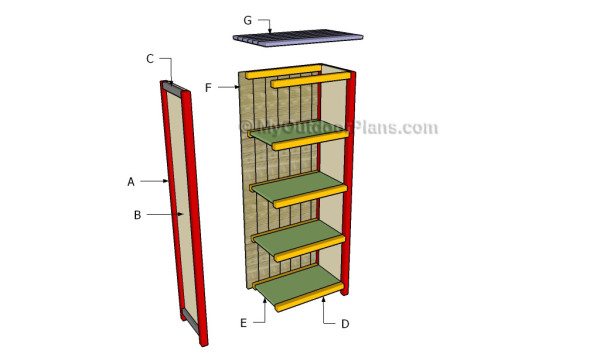This step by step diy project is about free bookshelf plans. If you want to build a rustic bookshelf out of common materials and using household tools, we recommend you to pay attention to the instructions described in the article. Adjust the size of the components with great care and lock them together by using waterproof glue and galvanized screws following the instructions.
It is essential to choose the right materials before starting the construction and the assembly of the diy wood bookshelf. As you will see in the project, you need to choose durable lumber with a nice appearance, such as pine, cedar or redwood. Make sure the components are in a good visual condition and choose professional tools when adjusting their size. Take accurate measurements and join the components with glue and screws. See all my Premium Plans HERE.
Projects made from these plans
Free Bookshelf Plans
Cut & Shopping Lists
- A – 4 pieces of 2×2 lumber – 63 1/4″ long LEGS
- B – 2 pieces of 1×12 lumber – 61″ long SIDE PANELS
- C – 4 pieces of 2×2 lumber – 11 1/4″ long SIDE SUPPORTS
- D – 10 pieces of 2×2 lumber – 21 1/2″ long SUPPORTS
- E – 4 pieces of 1×12 lumber – 21 1/2″ long SHELVES
- F – 7 pieces of 1×4 lumber – 61″ long BACK
- G – 5 pieces of 1×3 lumber – 26 1/2″ long, 1 piece of 1×4 – 26 1/2″ long TOP
- 8 pieces of 2×2 lumber – 8 ft
- 2 pieces of 1×12 lumber – 10 ft
- 7 pieces of 1×4 lumber – 8 ft
- 2 pieces of 1×3 lumber – 8 ft
- 1 1/4″ screws
- 1 5/8″ screws
- 2 1/2″ screws
- filler, stain
- glue
Tools
![]() Hammer, Tape measure, Framing square
Hammer, Tape measure, Framing square
![]() Miter saw, Drill machinery, Screwdriver, Sander
Miter saw, Drill machinery, Screwdriver, Sander
Time
![]() One day
One day
Related
How to build a bookshelf
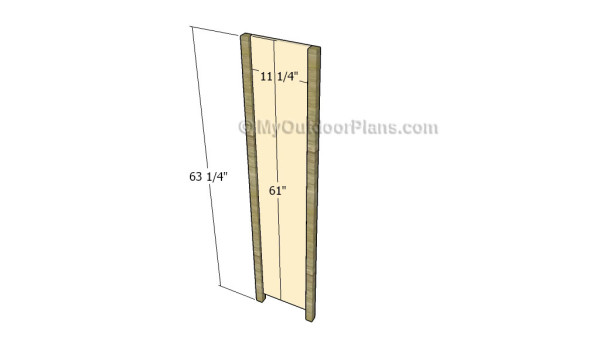
Building the sides of the bookself
The first step of the project is to build the sides for the bookshelf. As you can easily notice in the diagram, we recommend you to build the legs out of 2×2 lumber and the panels out of 3/4″ plywood. Cut the components at the right dimensions after marking the cut lines with great care.
Drill pocket holes along the sides and tops of the plywood panels and secure them to the legs by using 1 1/4″ screws and waterproof glue. Leave no gaps between the components.
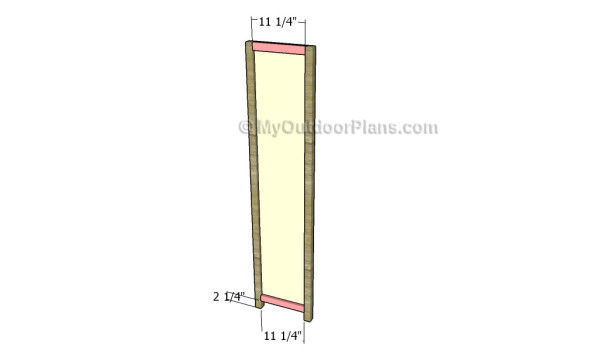
Attaching the trims to the sides
Attach 1×2 decorative trims to the sides of the bookshelf. In order to get a professional result, we recommend you to drill pocket holes at both ends of the trims and secure them to the legs by using 1 1/4″ screws and waterproof glue. In addition, drive in a few finishing nails to enhance the strength of the joints.
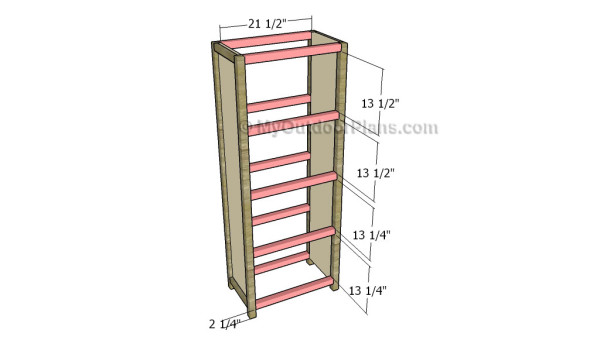
Assembling the frame of the bookself
Assembling the frame of the bookshelf is a straight forward process, as you need to build several supports out of 2×2 lumber and to lock them to structure as in the diagram. Drill pocket holes at both ends of the supports and secure them to the legs using 2 1/2″ screws. Make sure the corners are right-angled and add glue to the joints.
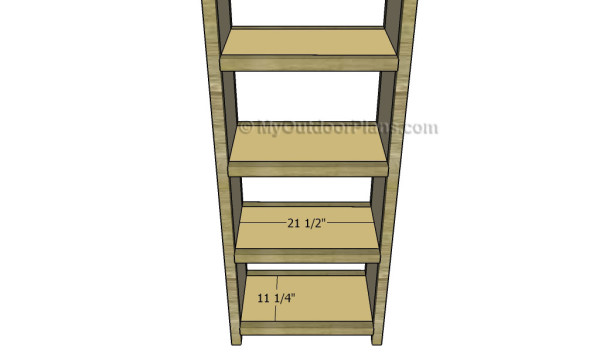
Fitting the shelves
Build the shelves out of 3/4″ plywood. Mark the cut lines on the 3/4″ sheets of plywood and get the job done with a circular saw. Smooth the cut edges with fine-grit sandpaper and remove the residues with a damp cloth.
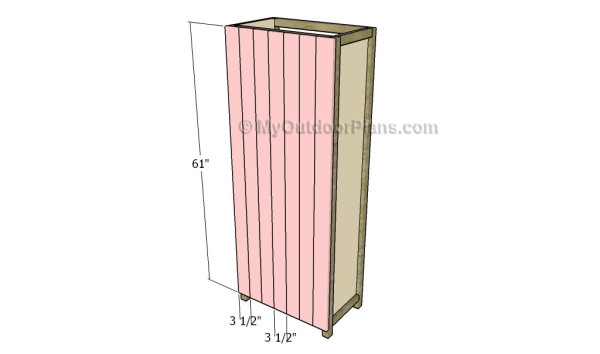
Attaching the slats to the back of the bookshelf
Next, attach the 1×4 slats to the back of the structure, as described in the diagram. Cut the slats at the right size and smooth the cut edges with sandpaper. Drill pocket holes along the edges of the of the slats and secure them together by using 1 1/4″ screws and waterproof glue.
Attach the panel to the back of the bookshelf, making sure the edges are flush. Check if the corners are right-angled and lock the panels into place by using 1 1/4″ screws and waterproof glue.

Attaching the top
Next, you have to assemble the top for the bookshelf and to install it into place by in a professional manner. Cut the components out of 1×4 lumber and out of 1×6 lumber. Drill pocket holes along one edge of the slats and insert 1 1/4″ screws into the adjacent component.
Leave no gaps between the components and add glue to create a proper bond. Insert screws through the pocket holes drilled along the top of the side components or through the top itself, after making pilot holes.
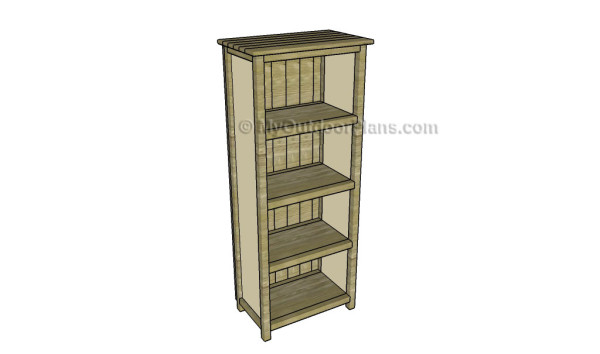
Free bookshelf plans
One of the last steps of the woodworking project is to take care of the finishing touches. Therefore, fill the pilot holes with wood putty and smooth the surface with 120-grit sandpaper.
Top Tip: In order to protect the lumber from water damage, we recommend you to cover the components with several coats of paint. Place the wooden bookshelf in a proper location and move it whenever necessary.
This woodworking project was about free bookshelf plans. If you want to see more outdoor plans, we recommend you to check out the rest of our step by step projects. LIKE us on Facebook to be the first that gets our latest plans. Send us pictures with your plans.

